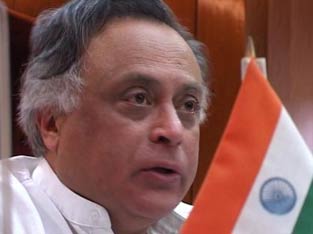Show us the money, say states
 At a time when India has sought global funds to adopt low-carbon technologies, the domestic global warming rhetoric has also got hotter with state governments asking the Centre to foot their green bills.
At a time when India has sought global funds to adopt low-carbon technologies, the domestic global warming rhetoric has also got hotter with state governments asking the Centre to foot their green bills.
The demand will be communicated to Environment Minister Jairam Ramesh, who will participate in a meeting of the chief ministers of Himalayan states starting in Shimla on Thursday.
Climate change is the effect of global warming, which is a series of increases in atmospheric temperatures.
Himachal Pradesh, Uttarakhand and some north-eastern states, where melting of glaciers will cause enormous ecological damage, are seeking Central compensation for their forests, which act as carbon sinks for emissions.
The environment ministry estimated in August that India’s forests, which cover 23 per cent of the country’s geographical area, can absorb up to 11 per cent of India’s carbon emissions.
India spends 2.6 per cent of its gross domestic product of Rs 48 lakh crore on negating the impact of environmental damage.
In the plains, Punjab, Haryana and Bihar have sought funds to develop crop varieties that can cope with temperature rise, shorter winters and inconsistent monsoon—the offshoots of climate change.
Himachal Chief Minister Prem Kumar Dhumal recently said at a conference of state chief ministers : “If the country thinks that Himalayan forests are India’s natural resource, we need to be compensated for preserving them.”
Ramesh said the XIIIth Finance Commission is considering awarding “green bonuses’’ to hill states .
Uttarakhand wants restrictions on the entry of people into bio-diversity hotspots Nanda Devi National Park, the Valley of Flowers and the Gangotri glacier.
“We won’t allow more than two annual visits by locals into these areas. For foreigners and Indians from other states, it will be once a year,” Chief Minister Ramesh Nishank said.
Nagaland Chief Minister Neiphiu Rio has sought a policy to reduce pressure on the state’s ecology without compromising the rights of the indigenous people to natural resources.
His Mizo counterpart Lal Thanhawla said the state needed money to conserve Indo-Burma biodiversity hotspots. “Mizoram showed the way by going organic a decade ago.”
Punjab is facing reduced wheat productivity due to rising temperatures.
Climate change would lead to a 30 per cent decline in agricultural output by 2030, said the Indian Council for Agricultural Research.
Till Central funds arrive, meeting the global warming challenge could be tough for the states.
— Inputs from Rahul Karmakar in Guwahati and Archana Phull in Shimla